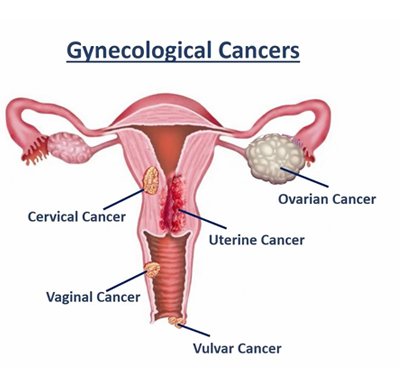
Gynecologic cancer is any cancer that starts in a woman’s reproductive organs. Cancer is always named for the part of the body where it starts. Gynecologic cancers begin in different places within a woman’s pelvis, which is the area below the stomach and in between the hip bones.
- Cervical cancer begins in the cervix, which is the lower, narrow end of the uterus. (The uterus is also called the womb.)
- Ovarian cancer begins in the ovaries, which are located on each side of the uterus.
- Uterine cancer begins in the uterus, the pear-shaped organ in a woman’s pelvis where the baby grows when a woman is pregnant.
- Vaginal cancer begins in the vagina, which is the hollow, tube-like channel between the bottom of the uterus and the outside of the body.
- Vulvar cancer begins in the vulva, the outer part of the female genital organs.
What Are the Symptoms?
There is no way to know for sure if you will get a gynecologic cancer. That’s why it is important to pay attention to your body and know what is normal for you, so you can recognize the warning signs or symptoms of gynecologic cancer.
If you have vaginal bleeding that is unusual for you, talk to a doctor right away. You should also see a doctor if you have any other warning signs that last for two weeks or longer and are not normal for you. Symptoms may be caused by something other than cancer, but the only way to know is to see a doctor.
Cervical Cancer: Early on, cervical cancer may not cause signs and symptoms. Advanced cervical cancer may cause bleeding or discharge from the vagina that is not normal for you, such as bleeding after sex. If you have any of these signs, see your doctor.
Ovarian Cancer: Ovarian cancer may cause the following signs and symptoms—
- Vaginal bleeding (particularly if you are past menopause), or discharge from your vagina that is not normal for you.
- Pain or pressure in the pelvic area.
- Abdominal or back pain.
- Bloating.
- Feeling full too quickly, or difficulty eating.
- A change in your bathroom habits, such as more frequent or urgent need to urinate and/or constipation.
Uterine Cancer: Uterine cancer may cause vaginal discharge or bleeding that is not normal for you. Bleeding may be abnormal because of how heavy it is or when it happens, such as after you have gone through menopause, between periods, or any other bleeding that is longer or heavier than is normal for you. Uterine cancer may also cause other symptoms, such as pain or pressure in your pelvis.
If you have bleeding that is not normal for you, especially if you have already gone through menopause, see a doctor right away. Also see a doctor if you have any other signs or symptoms for two weeks or longer. These things may be caused by something other than cancer, but the only way to know is to see your doctor.
Vaginal Cancer: Early on, most vaginal cancers do not cause signs and symptoms. But if there are symptoms, they may include —
- Vaginal discharge or bleeding that is not normal for you. The bleeding may be abnormal because of how heavy it is, or when it happens, such as bleeding after you have gone through menopause; bleeding between periods; or any other bleeding that is longer or heavier than is normal for you.
- A change in bathroom habits, such as having blood in the stool or urine, going to the bathroom more often than usual, or feeling constipated.
- Pain in your pelvis, the area below your stomach and in between your hip bones, especially when you pass urine or have sex.
Vulvar Cancer: Many women who have vulvar cancer have signs and symptoms. They may include-
- Itching, burning, or bleeding on the vulva that does not go away.
- Changes in the color of the skin of the vulva, so that it looks redder or whiter than is normal for you.
- Skin changes in the vulva, including what looks like a rash or warts.
- Sores, lumps, or ulcers on the vulva that do not go away.
- Pain in your pelvis, especially when you urinate or have sex.
How Are Gynecologic Cancers Treated?
If your doctor says that you have a gynecologic cancer, ask to be referred to a gynecologic oncologist—a doctor who has been trained to treat cancers of a woman’s reproductive system. This doctor will work with you to create a treatment plan.
Types of Treatment
Gynecologic cancers are treated in several ways. It depends on the kind of cancer and how far it has spread. Treatments include surgery, chemotherapy, and radiation. Women with a gynecologic cancer often get more than one kind of treatment.
Surgery: Doctors remove cancer tissue in an operation.
Chemotherapy: Using special medicines to shrink or kill the cancer. The drugs can be pills you take or medicines given in your veins, or sometimes both.
Radiation: Using high-energy rays (similar to X-rays) to kill the cancer.